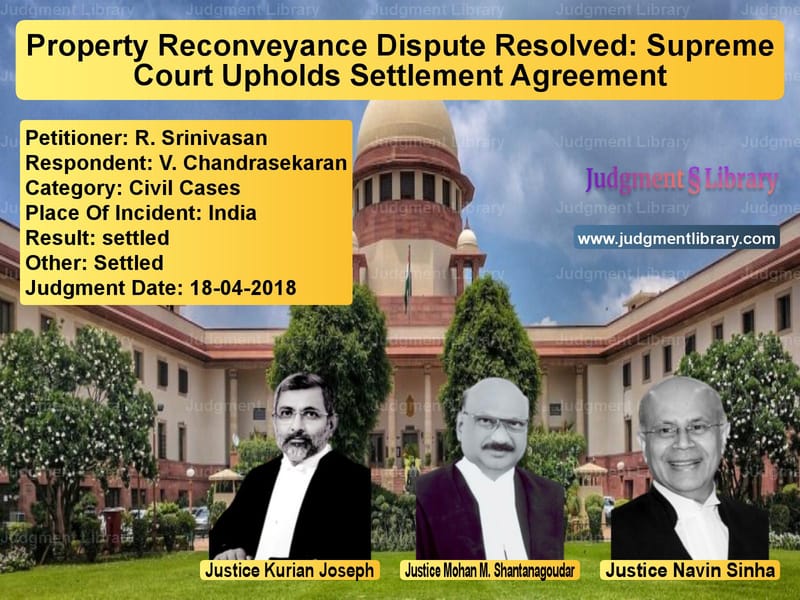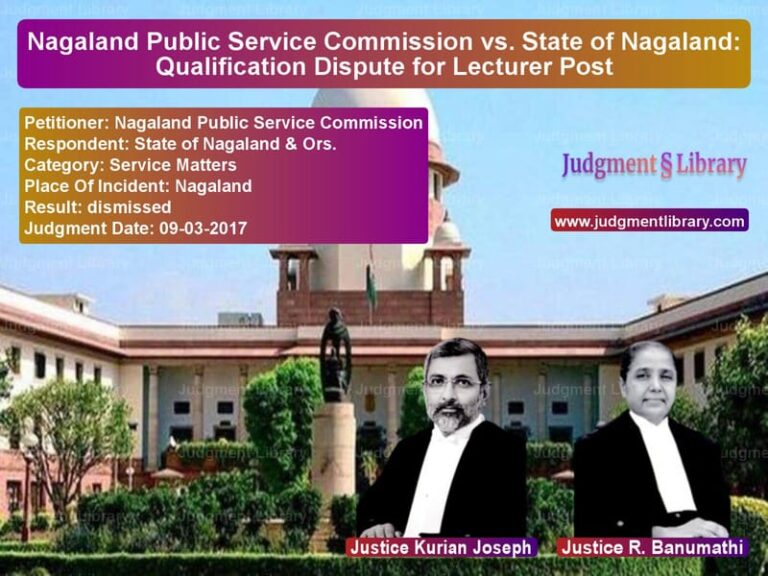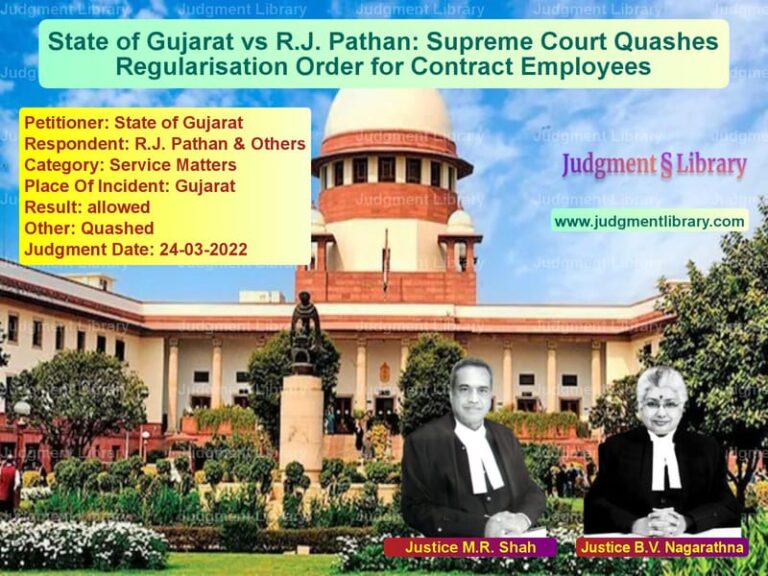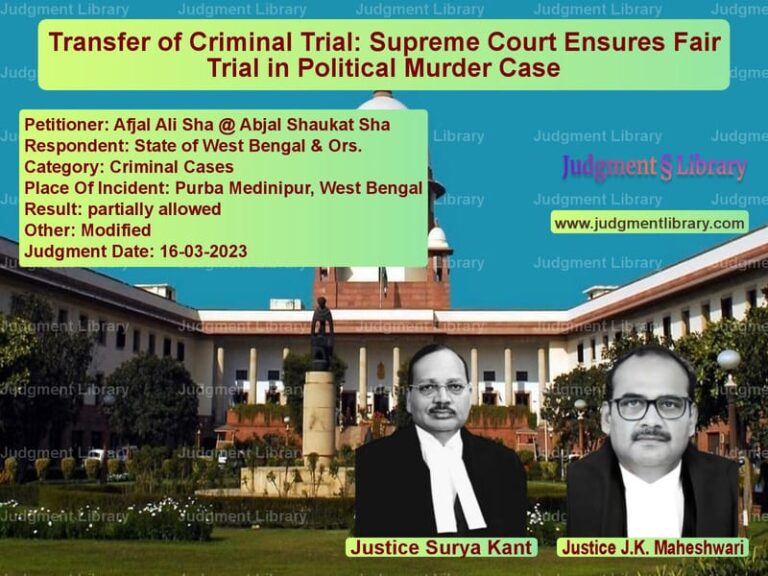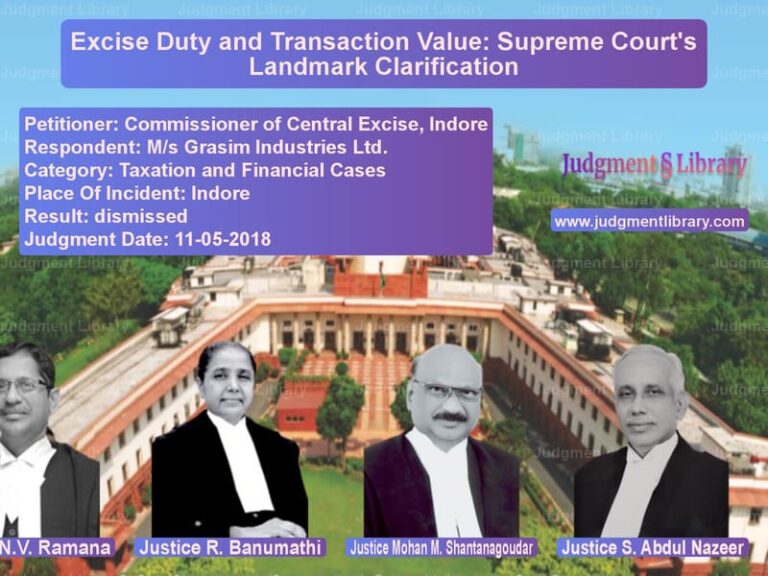Property Reconveyance Dispute Resolved: Supreme Court Upholds Settlement Agreement
The Supreme Court of India recently disposed of a long-pending property reconveyance dispute in the case of R. Srinivasan v. V. Chandrasekaran. The litigation, spanning nearly two decades, was settled through mediation, highlighting the importance of alternative dispute resolution mechanisms in resolving complex civil disputes. The Court recorded the terms of the settlement and directed both parties to adhere strictly to them.
Background of the Case
The dispute involved a reconveyance agreement concerning a property transaction. The appellant, R. Srinivasan, had claimed that the respondent, V. Chandrasekaran, had agreed to resell a property but failed to execute the agreement. Several attempts at reconciliation were made, yet the dispute persisted, leading to prolonged litigation in multiple courts.
Key Events:
- The case was litigated for over twenty years in various forums.
- The primary issue was whether the respondent had legally committed to reconveying the property to the appellant.
- Despite multiple negotiations, no amicable resolution was reached, leading the case to reach the Supreme Court.
- Recognizing the need for resolution, the Supreme Court appointed a mediator to assist in negotiations.
Petitioner’s (R. Srinivasan’s) Arguments
- The appellant argued that there was a clear agreement between the parties for reconveyance of the property.
- He contended that the respondent had unjustly refused to execute the reconveyance, despite repeated requests.
- The appellant cited multiple legal precedents supporting his claim that a contract for reconveyance is enforceable if the intent is clearly established.
- Due to the prolonged litigation, the appellant faced financial and legal hardships, necessitating a fair resolution.
Respondent’s (V. Chandrasekaran’s) Arguments
- The respondent claimed that there was no binding commitment to reconvey the property.
- He argued that procedural hurdles had prevented any execution of the alleged agreement.
- The respondent contended that the appellant had misinterpreted informal discussions as legally binding commitments.
- However, the respondent expressed willingness to settle the dispute to avoid further litigation.
Supreme Court’s Observations
The Supreme Court recognized the complexity of the case and the necessity of an amicable resolution. Key observations included:
- “Given the prolonged nature of the dispute, an amicable settlement is in the best interest of both parties.”
- “Mediation in property disputes plays a crucial role in resolving conflicts efficiently and fairly.”
- “The Settlement Agreement dated 19.04.2018 has been signed by both parties and shall be binding.”
- “Both parties must strictly adhere to the settlement terms to avoid further legal complications.”
The Settlement Agreement
Following mediation, a formal settlement agreement was signed, outlining the terms for resolving the dispute:
- The respondent agreed to reconvey the property upon fulfillment of specified financial obligations.
- The appellant agreed to withdraw all pending litigation related to the property dispute.
- Both parties agreed to bear their own legal costs and refrain from initiating further claims related to the matter.
Final Judgment
The Supreme Court disposed of the appeal based on the mutually agreed settlement. The Court ruled:
“The parties have amicably resolved their disputes through the Settlement Agreement dated 19.04.2018. The appeal is disposed of in terms thereof, and the parties are directed to abide by the agreement.”
The Court also expressed appreciation for the mediators, including Ms. Varuna Bhandari and Mr. Subramonium Prasad, who played a pivotal role in facilitating the settlement.
Significance of the Judgment
This ruling emphasizes the following key principles:
- Encouragement of Alternative Dispute Resolution (ADR): The judgment showcases the effectiveness of mediation in civil disputes.
- Binding Nature of Settlement Agreements: Once recorded by the Court, such agreements become enforceable.
- Judicial Endorsement of Mediation: The Supreme Court reinforced that litigation should be the last resort in property disputes.
Legal Precedents Considered
- Afcons Infrastructure Ltd. v. Cherian Varkey Construction Co. (2010) – Established that courts should encourage mediation in civil cases.
- Salem Advocate Bar Association v. Union of India (2005) – Recognized the importance of ADR in reducing the backlog of cases.
Conclusion
The Supreme Court’s decision highlights the importance of resolving disputes through mediation rather than prolonged litigation. By directing the parties to comply with the settlement, the Court has ensured justice is served efficiently and fairly.
Petitioner Name: R. Srinivasan.Respondent Name: V. Chandrasekaran.Judgment By: Justice Kurian Joseph, Justice Mohan M. Shantanagoudar, Justice Navin Sinha.Place Of Incident: India.Judgment Date: 18-04-2018.
Don’t miss out on the full details! Download the complete judgment in PDF format below and gain valuable insights instantly!
Download Judgment: R. Srinivasan vs V. Chandrasekaran Supreme Court of India Judgment Dated 18-04-2018.pdf
Direct Downlaod Judgment: Direct downlaod this Judgment
See all petitions in Property Disputes
See all petitions in Specific Performance
See all petitions in Contract Disputes
See all petitions in Judgment by Kurian Joseph
See all petitions in Judgment by Mohan M. Shantanagoudar
See all petitions in Judgment by Navin Sinha
See all petitions in settled
See all petitions in settled
See all petitions in supreme court of India judgments April 2018
See all petitions in 2018 judgments
See all posts in Civil Cases Category
See all allowed petitions in Civil Cases Category
See all Dismissed petitions in Civil Cases Category
See all partially allowed petitions in Civil Cases Category

